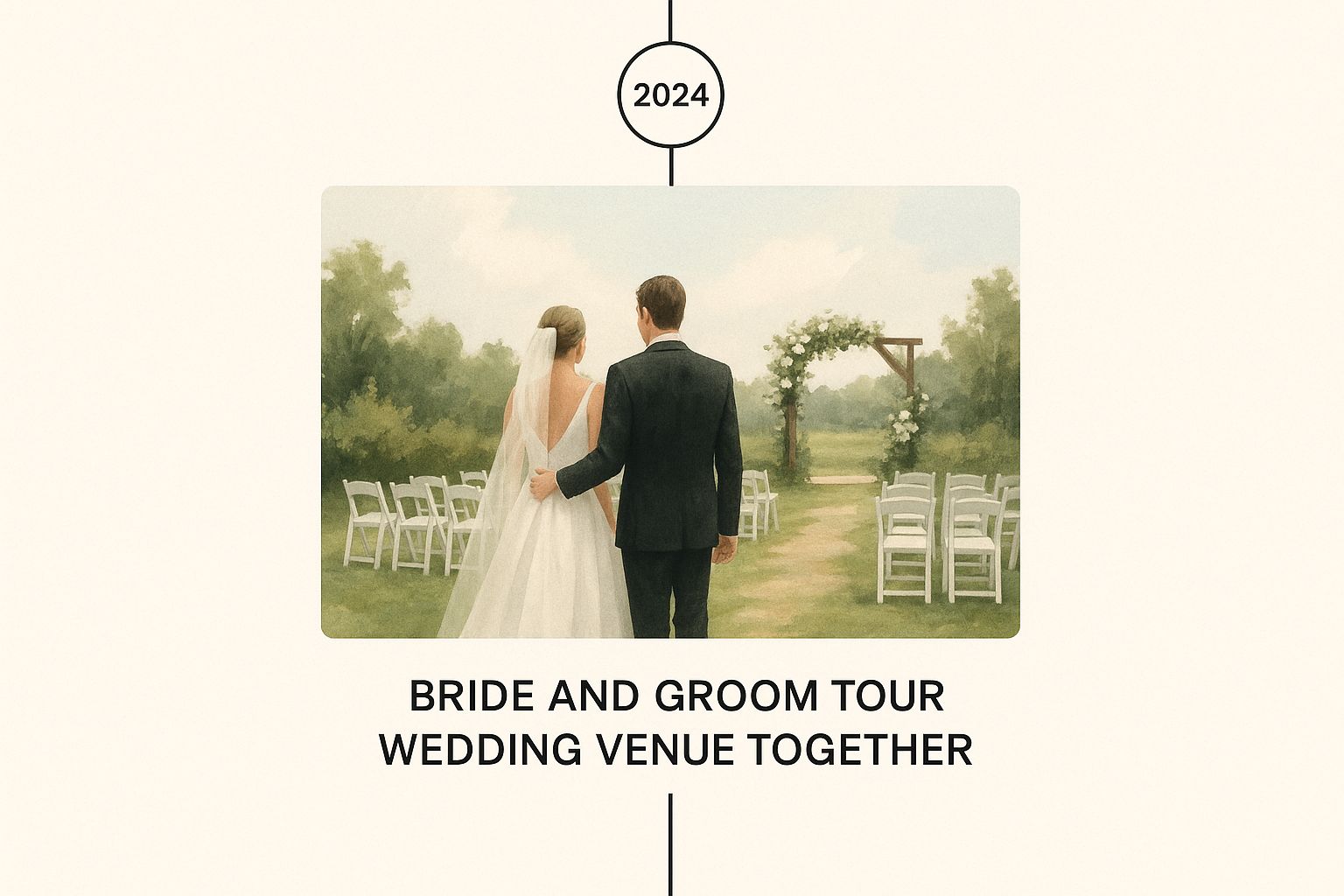Why a Strategic Wedding Timeline Changes Everything

Ever tried planning a wedding without a timeline? Talk about stressful! It's like trying to bake a wedding cake without a recipe – total chaos. A wedding planning timeline is essential. It's the roadmap to a successful celebration, keeping you organized and on track. This way, you can actually enjoy being engaged instead of constantly feeling overwhelmed.
A well-defined timeline breaks down the massive task of wedding planning into smaller, more manageable steps. This prevents those last-minute panics and reduces stress, so you can savor all the fun parts of planning your big day. Plus, a timeline helps you prioritize tasks and manage your budget effectively, which is super important. No one wants to start married life in debt! For those going the DIY route, check out these helpful tips on how to plan a wedding yourself.
Benefits of a Structured Approach
Having a wedding planning timeline doesn't mean sacrificing creativity. In fact, it can boost it! By creating a basic framework, you free up mental space to brainstorm unique ideas and personalize your celebration. This means you can focus on the details that make your wedding truly you.
A timeline also keeps everyone on the same page, especially your vendors. This clear communication minimizes mishaps and delays, making the entire planning process much smoother. Wedding planning is all about timing and organization. According to The Knot's 2025 Real Weddings Study, couples are focusing more on adding personal, creative touches. Around 85% of couples want their wedding to reflect their unique personalities. This emphasizes the importance of planning ahead! Check out more stats here.
Avoiding Common Pitfalls
Some people think a strict timeline makes wedding planning too rigid. But actually, a good timeline is adaptable! You can adjust it as needed. This flexibility is key when unexpected things pop up or plans change. It helps keep your vision intact. Think of your timeline as a living document, not something set in stone.
By taking a strategic approach to your wedding timeline, you're not just planning a wedding; you're creating a joyful and memorable experience. You’ll actually enjoy being engaged, instead of being stressed out. A strategic wedding planning timeline really does change everything. It transforms the planning process from chaotic to calm and from stressful to satisfying.
12-18 Months Out: Building Your Wedding Foundation
This first stage of wedding planning is all about setting the groundwork. Think of it like laying the foundation of a house – it’s the base for everything that comes after. The choices you make now will influence your entire wedding journey, from the overall style to the budget. Right now, we're focusing on the big picture: getting those must-have vendors booked and creating a solid plan for the coming months.
Setting the Date and Budget
First things first: pick a wedding date and set a preliminary budget. These two go hand-in-hand, since the date can affect venue availability and costs. Are you dreaming of a peak-season wedding or a more budget-friendly off-season celebration? Figuring this out helps you determine how much you'll need to save and spend.
Venue Selection and Guest List Creation
Next up: researching and visiting potential wedding venues. Your venue choice often sets the tone and size for your whole wedding. What kind of atmosphere are you going for? A rustic barn, a glamorous ballroom, or a beachside ceremony? While you’re venue hunting, start putting together your guest list. This helps determine capacity needs at your chosen venue and further refine your budget.

The image above shows a couple checking out a potential outdoor venue, highlighting how important venue selection is in this early planning phase. It perfectly captures the beginning stages of making wedding dreams a reality! Finding the right venue really does shape the whole feel and flow of your big day.
Securing Key Vendors
With a date, budget, and venue sorted, it's time to start booking those essential vendors. Photographers, videographers, and caterers tend to get booked far in advance, especially during peak season. Booking them early means you'll have your pick of the best. Popular photographers, for example, can be booked a year or more out. This proactive approach helps avoid disappointment later. Plus, the high demand for wedding services reflects the industry's serious growth. The global wedding industry is expected to reach USD 414 billion by 2030, growing at a rate of 4.8% each year. Find more detailed statistics here.
Planning for Success
Creating a detailed wedding planning timeline during these first 12-18 months builds a strong foundation. This groundwork lets you move forward with confidence, knowing you've tackled the crucial elements early. It also gives you plenty of time to research vendors, compare prices, and make smart decisions that fit your vision and budget. Remember, a well-structured plan is a good thing! It gives you the framework for a truly memorable and stress-free planning experience.
To help you stay organized, here's a handy table outlining the key tasks for this period:
Here’s a handy table to help you stay on track:
Essential Tasks for 12-18 Months Before Wedding:
| Timeframe | Task | Priority Level | Notes |
|---|---|---|---|
| 12-18 Months | Set Wedding Date & Budget | High | Consider seasonality and financial goals. |
| 12-18 Months | Choose Venue | High | Capacity, style, and availability are key factors. |
| 12-18 Months | Create Guest List Draft | High | Influences venue choice and budget. |
| 12-18 Months | Book Key Vendors (Photographer, Videographer, Caterer) | High | Secure in-demand professionals early. |
| 12-18 Months | Develop Wedding Planning Timeline | Medium | Establish a framework for future tasks. |
This table lays out the essential tasks and their priority levels for the 12-18 month period. By focusing on these high-priority items early on, you'll create a solid base for your wedding planning journey.
6-9 Months Out: Crafting Your Wedding Details
With the big stuff taken care of, like your venue and date, it's time to dive into the fun part: adding those personal touches that make your wedding truly you. Think of it as adding the finishing details to a masterpiece.
Attire and Aesthetic Refinement
Now that you've locked in your venue, you can start finalizing your attire. Your venue's style can heavily influence your attire choices. A rustic barn might call for lace and natural elements, while a modern art gallery could inspire sleek lines and bold accessories. Thinking about these things together creates a cohesive and visually stunning event.
Wedding Party Management and Pre-Wedding Events
It's time to finalize those wedding party plans! Coordinate outfits, plan those epic bachelor/bachelorette parties, and chat about everyone's roles and responsibilities. Keep the communication flowing with a shared online doc or regular updates. This keeps everyone in the loop and on the same page. Plus, don't forget to schedule those engagement parties and other pre-wedding festivities!
Registry Creation and Vendor Coordination
Creating your wedding registry is next on the list. Think outside the traditional gift box and consider experiences, honeymoon funds, or even charitable donations. Your registry should reflect your unique style as a couple. This is also the time to iron out the details with your vendors. Make sure your caterer, florist, and DJ are all aligned with your vision. Clear communication is key here.
Budget Tracking and Timeline Management
Believe it or not, timing plays a big role in your wedding budget. The global wedding industry is a USD 300 billion market in 2024, with the Asia-Pacific region making a significant contribution. Planning ahead, like registering for gifts 6-9 months in advance, helps you stay on budget and secure everything you need. Want to learn more about the wedding market? Check out this interesting article: Wedding Market Research.

Staying Organized and Avoiding Overwhelm
With so many moving parts, wedding planning can feel a bit overwhelming. Stay organized with a wedding planning app, a spreadsheet, or a good old-fashioned planner. Regularly check your budget and make adjustments as needed to prevent overspending. Prioritize tasks, communicate openly, and stick to your budget. These simple steps will make the planning process smoother and more enjoyable, setting the stage for a truly memorable celebration.
3-6 Months Out: Mastering Wedding Coordination
This is where it gets real, folks! Your wedding vision is about to transform from a Pinterest board into an actual event. Now's the time to lock down the important details and make sure everything's in sync for a smooth, stress-free wedding day. Think of yourself as the conductor of an awesome wedding orchestra, bringing all the different parts together in perfect harmony.
Finalizing the Menu and Ceremony Structure
You've probably already had your tasting with the caterer and drooled over all the delicious options. Now it's decision time! Finalize your wedding menu, remembering any dietary needs and preferences your guests might have. While you're at it, start putting together the structure for your wedding ceremony. Choose readings, pick the music, and decide on the overall vibe you want. This is your chance to create a ceremony that’s truly personal and meaningful, a reflection of your unique love story.
Managing RSVPs and the Day-Of Timeline
As those RSVPs start coming in, get a system in place to keep track of them. A simple spreadsheet or a dedicated wedding planning app can be a lifesaver for managing your guest list. Once you have a good handle on who's coming, you can finalize your day-of timeline. This detailed schedule will let everyone know – from the wedding party to the vendors – where they need to be and when. Keeping everyone on the same page will keep things running like clockwork.
Coordinating Transportation and Logistics
Don’t forget about transportation! Confirm arrangements for yourselves, your wedding party, and maybe even your guests. Whether you’re hiring a shuttle service or arranging individual cars, having the logistics sorted out will minimize stress and ensure everyone arrives on time. Think of it as the behind-the-scenes magic that makes your wedding day flow seamlessly.
Navigating Mid-Planning Challenges
Let’s be real, adjustments are totally normal in wedding planning. Maybe a vendor is no longer available, or your guest list has changed a bit. Use this time to tackle those challenges head-on and find solutions that work for you. It’s all about being flexible and refining your plans as needed. Perhaps you’ve had to switch vendors or some guests had to cancel. Adaptability is key at this stage. Stay calm, find solutions, and remember that even small changes can still lead to a perfect day. Keep those communication lines open with your vendors, especially as you finalize those last details.
Tracking Confirmations and Managing Documentation
Stay organized! Create a system for tracking vendor confirmations and keeping all your wedding-related documents in one place. This will prevent important details from getting lost in the shuffle and ensure you have everything at your fingertips as the big day gets closer. Remember, organized planning equals a relaxed and happy wedding day! A central hub for all your docs – whether it’s a digital folder or a good old-fashioned binder – is a great idea. This way, everything's easy to find, and you won't misplace anything important. This becomes even more important as the wedding day gets closer and the number of details multiplies.
1-3 Months Out: The Final Wedding Countdown
The final countdown is on! While the excitement is building, these last few months can also be a bit crazy. This is where focused effort and delegating tasks like a pro really come into play. Think of it as the final dress rehearsal before the main event.
Confirming Vendors and Having a Plan B
First things first, confirm all the details with your vendors. From the caterers and photographer to the DJ from 1021 Events, make sure everyone's on the same page about timings, what they're providing, and any special requests you have. This prevents last-minute surprises and lets you tackle any potential hiccups head-on. For example, double-check that your DJ at 1021 Events has your playlist and is ready to set the perfect mood with their lighting and sound systems. It's also a great time to lock down those special touches, like custom monograms or a fun photo booth backdrop, to really personalize your celebration. Having a Plan B is essential too. Things happen, vendors might cancel, so backup options are key to staying calm and carrying on.
Seating Charts, Wedding Party Prep, and the Rehearsal Dinner
Time to tackle the seating chart. It can be a bit of a puzzle, but the goal is to create a layout that encourages guests to mingle and enjoy themselves. Think about everyone's relationships and personalities to keep the vibes positive. Coordinating with your wedding party is also super important. Finalize outfits, confirm schedules for pre-wedding events, and make sure everyone knows their roles and responsibilities. And don't forget the rehearsal dinner! Coordinate everything with the venue, finalize the menu, and create a relaxed and fun atmosphere for your closest family and friends. It's a fantastic opportunity to connect with loved ones before the big day.
Self-Care, Delegation, and Taming Pre-Wedding Jitters
Amidst all the activity, remember self-care. Wedding planning can be stressful, so make time for things that help you relax and unwind. Yoga, meditation, or just spending quality time with your partner can make a world of difference. Delegating tasks is also crucial. Ask family, friends, or even a wedding planner to help with smaller jobs to lighten your load. You don't have to do it all! And finally, pre-wedding jitters are completely normal. Acknowledge any anxieties you're feeling and find ways to cope. Mindfulness, journaling, or talking to someone you trust can help. These self-care practices help you transition from planner to happy couple, ready to celebrate. By focusing on these key tasks, you can navigate the final countdown with confidence and embrace the joy of your upcoming wedding.
Wedding Week Mastery: Bringing It All Together
This is where all your hard work pays off! After months of meticulous planning, your wedding week is finally here. Drawing on advice from top wedding planners and recent newlyweds, this guide will help you navigate the week with grace and ease.
Final Preparations and Coordination
The week leading up to your wedding is about tying up loose ends. Confirm those final details with all your vendors, from the caterer to the DJ. Make sure you chat with your DJ at 1021 Events about playlists, lighting, and sound. Don’t forget about guests traveling from afar! Use this handy checklist for international guests: Ultimate International Moving Checklist for 2025. Double-check arrival times and any special needs. Finally, send out the final wedding day schedule to everyone involved, including the wedding party and family. This keeps everyone informed and prevents last-minute confusion.
Managing Emotions and Staying Present
Wedding week can be a whirlwind of emotions. Excitement, anticipation, and maybe a few pre-wedding jitters are totally normal! Make self-care a priority. Try relaxation techniques like deep breathing or meditation to manage stress. Spend quality time with your partner amidst the busyness, focusing on the joy of your upcoming celebration. Savor these special moments before you officially start your married life.
Wedding Day Timeline and Flexibility
A detailed wedding day timeline is key, but flexibility is just as important. Unexpected delays happen, so build some buffer time into your schedule. Think of your timeline as a guide, not a strict rulebook. This mindset helps you handle any surprises smoothly and keeps a positive vibe going all day long. Enjoy the journey, even with its little detours.
Delegation and Support Team
Don't try to do everything yourself! Delegate tasks to trusted family members or friends during wedding week. This frees you up to be present and soak in every moment. They can help with things like vendor communication, transportation, or last-minute errands. Having a solid support system lets you fully enjoy the festivities.
Creating Meaningful Moments
Among all the logistics, remember what this week is really about: celebrating your love! Create meaningful moments throughout the week. Maybe it’s a quiet dinner with your partner, a heart-to-heart with a loved one, or a pre-wedding toast with close friends. These special moments will make your wedding week even more memorable.
To help you stay organized and relaxed, check out this sample wedding week timeline:
Wedding Week Timeline Breakdown: Day-by-day schedule of events, responsibilities, and key moments during wedding week
| Day | Events | Responsibilities | Self-Care Tips |
|---|---|---|---|
| 7 Days Out | Final vendor confirmations | Delegate confirmation calls | Relaxing bath, early night |
| 6 Days Out | Welcome dinner for out-of-town guests | Oversee setup, greet guests | Meditation, quiet time with partner |
| 5 Days Out | Wedding rehearsal | Coordinate with officiant and party | Gentle exercise, massage |
| 4 Days Out | Pampering and beauty treatments | Relax and enjoy | Spa day, connect with friends |
| 3 Days Out | Final dress fitting | Confirm alterations, pack wedding attire | Mindfulness practice, journaling |
| 2 Days Out | Rehearsal dinner | Host and enjoy | Deep breathing, light yoga |
| 1 Day Out | Wedding eve relaxation | Delegate last-minute tasks | Quiet evening, early bedtime |
This table provides a starting point. Feel free to adjust it to fit your own needs and create a week that is both organized and truly special. Remember, this is your celebration!
Customizing Your Wedding Timeline for Any Scenario
Every wedding is unique, so your wedding planning timeline should be just as special. Whether you're working with a six-month engagement or planning for two years, tweaking a standard timeline to fit your situation is key to a smooth experience. Let's look at how to adjust timelines for different scenarios, like destination weddings, cultural traditions, and unexpected life events.
Adapting for Shorter Engagements
A shorter engagement doesn't mean you have to compromise on your dream wedding. It just means you need a more focused approach to planning. Prioritizing is essential. Lock down your venue and key vendors first. Streamlining tasks like sending digital save-the-dates and using online planning tools like The Knot can save you tons of time. Instead of individual vendor meetings, why not try a group video call to discuss all the details at once? This keeps things moving without sacrificing organization.
Extending Your Planning Period
While 12-18 months is typical, a longer planning period might be better for some couples. This is especially helpful for destination weddings or if you’re incorporating elaborate cultural traditions. But a longer timeline doesn't mean endlessly scrolling through Pinterest. Break it down into smaller, manageable phases, with deadlines for each. This prevents burnout and keeps you motivated. Think of it like training for a marathon—smaller "training runs" make the overall goal less intimidating.
Destination Weddings and Cultural Considerations
Destination weddings usually require extra planning time for travel arrangements and coordinating vendors across different locations. Things like arranging guest transportation or figuring out local marriage license requirements can get tricky. Similarly, incorporating cultural traditions might mean specific timing considerations, like auspicious dates or longer ceremonies. Adding these details to your wedding planning timeline is crucial for a seamless and respectful celebration.
Navigating the Unexpected
Life happens! Unexpected things, from family emergencies to job changes, can impact your planning. Building flexibility into your timeline from the start can make handling surprises so much easier. Think about contingency plans, like backup vendors or alternative dates. Wedding insurance can offer financial protection and peace of mind, too.
Real Wedding Examples: Lessons Learned
Take Sarah and John, who planned their wedding during a pandemic. Their venue cancelled, but their flexible timeline meant they found another amazing option and still got married on their new date. Or consider Maria and David, who included Indian wedding traditions in their celebration. They extended their planning period to fit the multi-day events, creating a vibrant and culturally rich experience. These examples show how adaptability and good planning can turn potential problems into opportunities.
Creating a flexible and personalized wedding planning timeline allows you to enjoy the process, no matter what. With these tips, you can create a timeline that truly reflects your unique vision and your special journey to the altar.




